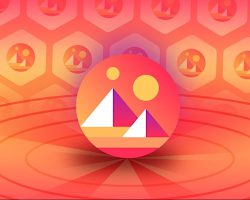Top Metaverse Platforms Redefining How We Work From Now On
The term “Metaverse” refers to a virtual reality (VR) or augmented reality (AR) space where people can interact with each other and digital objects in a shared virtual environment. It is often described as a fully immersive and interconnected universe, similar to the concept depicted in science fiction novels and movies. The Metaverse platforms are the underlying technology or framework that enables the creation, development, and operation of such a virtual universe.
A Metaverse platform provides the infrastructure and tools necessary for users to access and participate in the virtual world. It typically includes elements like virtual reality headsets, haptic devices, motion tracking systems, and software applications that allow users to navigate and interact within the Metaverse. These platforms can be accessed through various devices, such as VR headsets, smartphones, or desktop computers, depending on the capabilities and preferences of the user.
The Metaverse platform encompasses several key components that work together to create a seamless and immersive experience. These components include:
1. Virtual Environment: The Metaverse platform provides a digital space or environment where users can explore, interact, and create content. This environment is usually represented as a three-dimensional (3D) virtual world with its own physics, rules, and properties. Users can navigate this world using avatars or virtual representations of themselves.
2. Social Interaction: One of the fundamental aspects of the Metaverse is the ability for users to interact with each other. The platform enables social interactions through features like voice chat, text messaging, and gestures, allowing users to communicate and collaborate in real-time. This social aspect fosters a sense of community and enables shared experiences within the virtual universe.
3. User-generated Content: Metaverse platforms often provide tools and frameworks for users to create and customize their own virtual content. This can include building structures, designing virtual objects, scripting interactive elements, or even developing entire virtual worlds. User-generated content contributes to the richness and diversity of the Metaverse, allowing for endless possibilities and creativity.
4. Economy and Commerce: The Metaverse platform can support a virtual economy where users can buy, sell, and trade virtual assets and goods. These assets can include virtual real estate, clothing for avatars, unique virtual objects, or even virtual currencies. The platform provides secure transaction mechanisms and marketplaces to facilitate these economic activities.
5. Cross-platform Integration: Metaverse platforms strive to be accessible across multiple devices and operating systems. They aim to seamlessly integrate VR, AR, and traditional computing technologies, allowing users to interact with the Metaverse using the device of their choice. Cross-platform compatibility ensures a broader user base and encourages widespread adoption.
The concept of the Metaverse has gained significant attention in recent years, fueled by advancements in VR, AR, and blockchain technologies. Several companies and organizations are actively developing Metaverse platforms, each with their own approach and features. These platforms aim to revolutionize the way we connect, communicate, work, play, and experience digital content by creating an immersive and interconnected virtual universe.
Also read: Here Are The Top 10 Metaverse Platforms In 2022
Use Cases of Metaverse Platforms
Metaverse platforms offer a wide range of use cases across various industries and domains. Here are some detailed examples of how Metaverse platforms can be utilized:
1. Social Networking and Communication: Metaverse platforms provide an immersive and interactive environment for social networking and communication. Users can meet and interact with friends, family, or even strangers in a virtual space, enhancing social connections and fostering new relationships. These platforms enable real-time voice and text chat, allowing people to communicate and collaborate in a more engaging and expressive manner.
2. Virtual Meetings and Collaboration: Metaverse platforms can revolutionize the way people collaborate and conduct meetings. Instead of traditional video conferencing, participants can gather in a virtual meeting room where they can see and interact with each other as avatars. This immersive experience enhances remote collaboration, making it feel more natural and engaging. Users can also share and manipulate virtual objects, documents, or whiteboards, enabling dynamic and interactive teamwork.
3. Education and Training: Metaverse platforms have great potential in the field of education and training. Virtual classrooms can be created where students and teachers can interact in a realistic 3D environment. These platforms can simulate real-world scenarios, allowing students to practice skills and gain practical experience. Virtual field trips, historical reconstructions, and science simulations are just a few examples of how Metaverse platforms can enhance learning outcomes.
4. Entertainment and Gaming: The entertainment industry can leverage Metaverse platforms to provide immersive and interactive experiences to users. Virtual concerts, live performances, and art exhibitions can be hosted in virtual venues, allowing people from around the world to participate. Gaming experiences can be taken to the next level, enabling players to enter a fully immersive virtual world and interact with other players in real-time.
5. Virtual Commerce and Retail: Metaverse platforms offer new opportunities for e-commerce and retail businesses. Virtual stores and showrooms can be created where users can explore and purchase virtual goods or real-world products. Users can try on virtual clothing or test virtual versions of products before making a purchase. Brands can create unique and engaging experiences that blend the physical and virtual worlds, creating a novel shopping experience for customers.
6. Healthcare and Therapy: Metaverse platforms have the potential to enhance healthcare and therapy practices. Virtual environments can be used for rehabilitation and physical therapy, providing a safe and controlled space for patients to exercise and recover. Telemedicine can be enhanced through immersive consultations, where doctors and patients can interact virtually. Additionally, virtual support groups and therapy sessions can be conducted to provide mental health support in a more immersive and inclusive manner.
7. Virtual Real Estate and Architecture: Metaverse platforms can enable the creation and exploration of virtual real estate and architectural designs. Users can build and customize virtual homes, offices, or entire cities. Architects and urban planners can use these platforms to visualize and simulate designs before actual construction. Virtual real estate can be bought, sold, and developed, creating a new market for digital property.
These are just a few examples of the many potential use cases for Metaverse platforms. As the technology evolves and adoption increases, we can expect to see even more innovative applications across a wide range of industries and domains.
Also read: Top 10 Ways NFT Gaming Is Affected By Metaverse Development
Top Metaverse Platforms Redefining how we Work
The metaverse is a hot topic in the tech world, and for good reason. This immersive virtual world has the potential to revolutionize the way we work, learn, and play.
Here are some of the top metaverse platforms that are redefining how we work in 2023:
- Decentraland is a 3D virtual world where users can buy land, build avatars, and interact with each other. It has been used for a variety of work-related purposes, including conferences, training sessions, and even job interviews.

- The Sandbox is another popular metaverse platform that is being used for work. It offers a variety of tools for creating and monetizing experiences, making it a good option for businesses that want to create their own virtual workplaces.

- Roblox is a gaming platform that is also being used for work. It offers a variety of educational and training experiences, as well as opportunities for remote collaboration.

- Microsoft Mesh is a metaverse platform from Microsoft that is designed for businesses. It offers a variety of features for remote collaboration, including 3D avatars, real-time audio and video, and shared whiteboards.

- Facebook Horizon is a metaverse platform from Meta (formerly Facebook) that is still in development. However, it has the potential to be a major player in the workplace metaverse.

These are just a few of the many metaverse platforms that are being used for work. As the metaverse continues to develop, we can expect to see even more innovative ways to use it for professional purposes.
How the metaverse is redefining work
The metaverse has the potential to revolutionize the way we work in a number of ways. For example, it can:
- Improve collaboration: The metaverse can make it easier for people to collaborate on projects, regardless of their location. This is because it allows people to interact with each other in a virtual space, as if they were in the same room.
- Provide immersive training: The metaverse can be used to provide immersive training experiences. This can be helpful for training employees on new software or procedures.
- Create new opportunities: The metaverse can create new opportunities for businesses, such as the ability to sell virtual goods and services. It can also open up new ways for people to work, such as as freelancers or contractors.
Benefits of Metaverse Platforms
Metaverse platforms offer numerous benefits across various aspects of our lives. Here are detailed explanations of the advantages of Metaverse platforms:
1. Enhanced Immersive Experience: Metaverse platforms provide users with a highly immersive experience by creating virtual environments that replicate real-world scenarios or offer entirely new and imaginative experiences. Through virtual reality (VR) or augmented reality (AR) technologies, users can engage with a three-dimensional (3D) environment, interact with objects and other users, and explore virtual spaces. This heightened immersion adds a new level of realism and engagement to various activities, from socializing to gaming, education, and beyond.
2. Expanded Social Connectivity: Metaverse platforms facilitate social interactions on a global scale. Users can connect with friends, family, colleagues, or even strangers from around the world in virtual environments. These platforms foster a sense of presence and closeness, enabling people to communicate, collaborate, and share experiences in a more meaningful way than traditional online communication methods. Metaverse platforms promote a sense of community and enable connections that transcend physical boundaries.
3. Innovative Collaboration Opportunities: Metaverse platforms revolutionize remote collaboration by providing shared virtual spaces where users can meet, interact, and work together. Instead of traditional video conferencing or chat tools, users can gather in a virtual meeting room or workspace, where they can see and interact with each other as avatars. This immersive collaboration fosters creativity, teamwork, and productivity, enabling users to brainstorm, create, and solve problems in a dynamic and interactive manner.
4. Personalized and Customizable Experiences: Metaverse platforms allow users to personalize their virtual presence and experiences. Users can create and customize their avatars, virtual environments, and even virtual objects. This customization enables individuals to express their unique identities and preferences, fostering a sense of ownership and creativity within the Metaverse. Users can also tailor their experiences by choosing the types of virtual spaces they want to explore or participate in, creating a more personalized and fulfilling journey.
5. Accessible Anytime, Anywhere: Metaverse platforms aim to be accessible across multiple devices, such as VR headsets, smartphones, or desktop computers. This accessibility enables users to access the Metaverse from anywhere and at any time, as long as they have an internet connection and a compatible device. Users can seamlessly transition between virtual and physical environments, allowing for flexibility and convenience in engaging with the Metaverse.
6. Diverse Applications and Use Cases: Metaverse platforms offer a wide range of applications and use cases across various industries and domains. From education and training to entertainment, healthcare, retail, and beyond, the Metaverse provides a versatile platform for innovation and exploration. These platforms enable the creation of virtual worlds, virtual economies, and unique experiences that can enhance productivity, learning outcomes, entertainment value, and more.
7. Economic Opportunities: Metaverse platforms can create new economic opportunities and revenue streams. Virtual economies can be established within the Metaverse, where users can buy, sell, and trade virtual goods, services, or even virtual real estate. This creates a market for digital assets, opening up avenues for entrepreneurship, virtual businesses, and job opportunities. Additionally, companies and organizations can leverage the Metaverse to reach new audiences, engage customers in novel ways, and explore innovative business models.
8. Environmental Impact: Metaverse platforms have the potential to reduce the environmental impact associated with certain activities. For instance, virtual meetings and conferences in the Metaverse can replace physical travel, resulting in reduced carbon emissions and resource consumption. Similarly, virtual shopping experiences can minimize the need for physical retail spaces and packaging materials. By leveraging the virtual world, Metaverse platforms contribute to sustainability and environmental conservation efforts.
Overall, Metaverse platforms offer a plethora of benefits, including enhanced immersion, social connectivity, collaboration opportunities, personalization, accessibility, diverse applications, economic opportunities, and environmental impact reduction. As the technology continues to advance, we can expect these advantages to further evolve and shape the way we interact, learn, work, and entertain ourselves.
Future of Metaverse Platforms
The future of Metaverse platforms holds tremendous potential for transformative changes in how we live, work, and interact with digital content. Here are detailed explanations of some key aspects that are expected to shape the future of Metaverse platforms:
1. Advancements in Immersive Technologies: As technology continues to evolve, we can expect significant advancements in immersive technologies such as virtual reality (VR), augmented reality (AR), and mixed reality (MR). These advancements will result in more realistic, immersive, and seamless experiences within the Metaverse. Improved display resolutions, haptic feedback, gesture recognition, and eye-tracking capabilities will contribute to a more immersive and interactive virtual environment.
2. Seamless Cross-Platform Integration: The future of Metaverse platforms will involve seamless integration across various devices and platforms. Users will be able to access the Metaverse through VR headsets, smartphones, tablets, or other wearable devices, depending on their preferences and requirements. This cross-platform integration will enable a more connected and inclusive virtual experience, allowing users to transition between physical and virtual environments effortlessly.
3. Interconnectivity and Standardization: The Metaverse of the future will focus on creating a unified and interconnected digital ecosystem. Efforts will be made to establish interoperability and standardization across different Metaverse platforms, allowing users and content to seamlessly transition between different virtual worlds. This interconnectedness will enhance the sense of a shared virtual universe, enabling users to connect, communicate, and collaborate across different Metaverse platforms.
4. Artificial Intelligence and Virtual Assistants: Artificial intelligence (AI) will play a crucial role in shaping the future of Metaverse platforms. AI algorithms will enable smarter virtual environments that can dynamically adapt to users’ preferences, behaviors, and needs. Virtual assistants powered by AI will provide personalized and contextualized experiences, assisting users in navigating the Metaverse, finding relevant content, and enhancing interactions with virtual objects and other users.
5. User-Created Content and Decentralization: User-generated content will continue to thrive within the Metaverse of the future. Platforms will offer more powerful and user-friendly tools for creating, customizing, and sharing virtual content. Additionally, blockchain technology and decentralized platforms will empower users with greater ownership and control over their virtual assets and creations. This decentralization will facilitate secure transactions, protect intellectual property rights, and enable a more democratic and inclusive Metaverse.
6. Convergence of Real and Virtual Worlds: The future of Metaverse platforms will see a greater convergence of the real and virtual worlds. Augmented reality technologies will enable seamless integration of virtual content into the physical environment, blurring the boundaries between the two. Virtual objects and information will overlay the physical world, enhancing our understanding, productivity, and entertainment in real-time. This convergence will bridge the gap between physical and virtual experiences, enabling a more integrated and holistic digital lifestyle.
7. Multi-Dimensional Experiences: The future Metaverse will expand beyond traditional 3D virtual environments. Advancements in technologies like volumetric capture, 3D scanning, and spatial computing will enable multi-dimensional experiences within the Metaverse. Users will be able to interact with holographic representations of real-world objects and individuals, creating a more immersive and realistic virtual environment.
8. Transformation of Industries: Metaverse platforms have the potential to transform various industries. For instance, education and training will embrace immersive learning experiences, healthcare will utilize virtual simulations and telemedicine, retail will create interactive virtual shopping experiences, and architecture and urban planning will utilize virtual modeling and simulations. Metaverse platforms will reshape how we work, learn, entertain, and engage in economic activities.
It is important to note that the future of Metaverse platforms will require careful consideration of ethical, privacy, and security concerns. As the technology advances, addressing issues related to data privacy, virtual identity, digital rights, and security will be critical to ensure a safe and inclusive Metaverse for all users.
In summary, the future of Metaverse platforms holds immense potential for transformative experiences and interactions. Advancements in immersive technologies, cross-platform integration, AI, user-generated content, convergence of real and virtual worlds, and industry transformations will shape the Metaverse into a dynamic, interconnected, and user-centric digital ecosystem.
📚 Curious about #IGAMES? Dive into our white paper for an insightful look at our decentralized web3 gaming platform & ecosystem!
🎮 Discover how we’re shaping the future of gaming through imagination, IGS tokens, NFTs, and more. Join us in building the decentralized Metaverse!…
— iGAMES – We make GameFi better (@igamesbrands) August 3, 2023
Stay informed with daily updates from Blockchain Magazine on Google News. Click here to follow us and mark as favorite: [Blockchain Magazine on Google News].
Get Blockchain Insights In Inbox
Stay ahead of the curve with expert analysis and market updates.
latest from tech
Disclaimer: Any post shared by a third-party agency are sponsored and Blockchain Magazine has no views on any such posts. The views and opinions expressed in this post are those of the clients and do not necessarily reflect the official policy or position of Blockchain Magazine. The information provided in this post is for informational purposes only and should not be considered as financial, investment, or professional advice. Blockchain Magazine does not endorse or promote any specific products, services, or companies mentioned in this posts. Readers are encouraged to conduct their own research and consult with a qualified professional before making any financial decisions.

 Bitcoin
Bitcoin  Ethereum
Ethereum  Tether
Tether  XRP
XRP  Solana
Solana  Dogecoin
Dogecoin  USDC
USDC  Lido Staked Ether
Lido Staked Ether  Cardano
Cardano  TRON
TRON  Avalanche
Avalanche  Chainlink
Chainlink  Toncoin
Toncoin  Wrapped stETH
Wrapped stETH  Wrapped Bitcoin
Wrapped Bitcoin  Sui
Sui  Shiba Inu
Shiba Inu  Stellar
Stellar  Polkadot
Polkadot  Hedera
Hedera  Hyperliquid
Hyperliquid  WETH
WETH  Bitcoin Cash
Bitcoin Cash  LEO Token
LEO Token  Uniswap
Uniswap  Litecoin
Litecoin  Pepe
Pepe  Wrapped eETH
Wrapped eETH  NEAR Protocol
NEAR Protocol  Ethena USDe
Ethena USDe  USDS
USDS  Aptos
Aptos  Aave
Aave  Internet Computer
Internet Computer  Cronos
Cronos  POL (ex-MATIC)
POL (ex-MATIC)  Mantle
Mantle  Ethereum Classic
Ethereum Classic  Render
Render  WhiteBIT Coin
WhiteBIT Coin  MANTRA
MANTRA  Monero
Monero  Dai
Dai  Bittensor
Bittensor  Artificial Superintelligence Alliance
Artificial Superintelligence Alliance  Arbitrum
Arbitrum  Ethena
Ethena 



